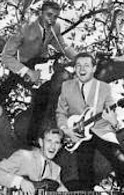
 Single on RCA YouTube by Beatles-influenced Sydney band, produced by Johnny Devlin. It was also released as a single on RCA in the USA in '64.
Single on RCA YouTube by Beatles-influenced Sydney band, produced by Johnny Devlin. It was also released as a single on RCA in the USA in '64.
This was a double-sided cover of The Marauders' UK single: the Cicadas' B-side, Hey Wha' D'Ya Say (Stephens-Leander), had also been the Marauders' B-side.
The Cicadas started out as a middle-of-the-road band called the The Hi-Fi's until they caught the Merseybeat bug. They later moved to the UK where they released a number of singles, notably The Magic Book (1966), using the name The Gibsons. (See The Gibsons'
UK discography at 45-rpm.org.uk.)
The Cicadas also recorded another Marauders song from 1963, also written by Carter & Lewis, Always On My Mind (1964).
Yet another Carter-Lewis song recorded by The Cicadas was Let's Try Again, released in early 1964, predating the only other known version, by The Rockin' Berries in 1965. (Thanks to Kevin Sharkey.)
Further reading: Terry Stacey's account of The Cicadas and their Beatles-influenced contemporaries at PopArchives:The Blog.
Single on the short-lived New York label Amcan (owned by Canadian-American) that charted at New York state station WTRY.
North London band The Limeys released singles in the UK and in the USA 1964-66. Because limey is American slang for an English person, it would be easy to take them for an American band attempting a British-sounding name (cf. The Buckinghams, The Sir Douglas Quintet). It's possible, though, that these Brits had the British Invasion of the US music market in mind.
The Radio London website lists personnel as Gary Gretch, Barry Johns, Tony Skey, Raymond Benot/Benoit and Gearie Kenworthy. Kenworthy later joined 60s British band The Knack on bass (not the more famous American Knack of the 70s).
See also Cara-Lyn/Cara-Lin.
Not to be confused with 1970s British band Limey.
References: 1. Limeys releases at 45cat. A comments thread at another Limeys page at 45cat has details of the Swinging 66 package tour for offshore station Radio England. The consensus there supports my impression that not much is known about the band. 2. Limeys personnel and brief notes at Radio London.
Thanks to Peter Grad, Terry Stacey, and Jerry Welz at Canadian-American.
Single on Viking, B-side of Simple Simon. Jan Dalton released three singles on Viking 1962-63. She also appeared as a vocalist with early-60s Auckland pop dance band The Al Paget Sextet. Her brother was Viking Records executive Ron Dalton.
References: 1. Jan Dalton page at Bruce Sergent's NZ music website. 2. Al Paget Sextet page (including photos of Jan Dalton with the band) at Audio Culture.
Version alert from Terry Stacey.
Single on Decca. YouTube The B-side was a Geoff Stephens-Mike Leander song, Hey Wha’ D’Ya Say, also recorded by Australia’s Cicadas for the B-side of their version of That’s What I Want.
The Marauders were a band from Stoke-on-Trent who frequently played at Liverpool’s Cavern: see their singles discography at 45-rpm.org.uk.
The composers, John Carter (born John Shakespeare) and Ken Lewis (born Kenneth James Hawker), had been partners in songwriting and performing since the end of the 50s. With Perry Ford, they recorded as The Ivy League from 1965. Later, Carter and Lewis were involved, for example, in The Flowerpot Men (Let’s Go To San Francisco), White Plains (My Baby Loves Lovin’) and First Class (Beach Baby).
Carter & Lewis also wrote Always On My Mind, another Marauders song (1963) later recorded by The Cicadas (1964).
c. 1965
Apparently unreleased track, later included on Raven Records’ Ugly Things – The CD (1992).
Melbourne band: see their hit Rockin’ Robin.
Thanks to Terry Stacey for version alert.
Single on Pye by band also known as The Tony Jackson Group.
Tony Jackson (1940-2003) was the original bassist and lead singer of The Searchers, the band he quit in July 1964.
References: 1. Hiroshi Asada’s John Carter songlist. 2. Tony Jackson & The Vibrations from British Beat Boom [archived page].
Thanks to Terry Stacey for filling in the gaps that I totally missed.
Last single, on W&G, by Hobart band known locally as 'Tasmania's answer to The Beatles' and 'The Mighty Kravats'. Like many Australian bands of the beat era The Kravats, formed in 1958, started out playing in the style of The Shadows: their first big hit in Hobart was an instrumental, Puppet Strings / Bei Mir Bist Duschoen (1964).
After another instrumental record, Fred / Jindivick, both original compositions, went Top 5 in Hobart in 1965, The Kravats took on the British Invasion with Barry Woodruff as lead singer and managed to keep The Beatles' Help from #1 for three weeks with Baby Let Me Take You Home.
Reference: Ian McFarlane, Encyclopedia of Australian Rock & Pop.
Version alert from Terry Stacey.
Single on CBS (UK), produced by Irving Martin.
Reference: Hiroshi Asada's John Carter songlist. Label shot at eBay Oct 2008.
See also: Irving Martin Productions page at Martin Roberts's website.